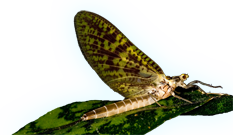Blog & Latest Updates
Fly Fishing Articles
Insects by Common Name

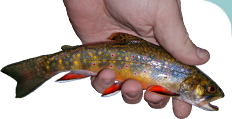
Catch & release smoked grayling on the Chena
I recently spent (Spent: The wing position of many aquatic insects when they fall on the water after mating. The wings of both sides lay flat on the water. The word may be used to describe insects with their wings in that position, as well as the position itself.) a day up the Chena fishing for grayling and teaching a vacationing wildlife biologist how to fly fish. She became proficient quickly and caught her first grayling in a pool by the road during casting lessons. We then bushwhacked into some out-of-the-way spots where we both caught many fish.
Throughout the day the Chena valley was shrouded in smoke from the 30,000-acre Stuart Creek #2 forest fire burning about 7 miles south of the river. The same drought that fueled the fire had the river lower than it ever gets in most years. This made for easy wading and excellent grayling fishing, because the lower water concentrates the fish in even more predictable places than usual.
Trout often become more wary and choosy under such conditions, and the grayling were showing signs of those symptoms too. They were still grayling, however, and accommodating their whims meant switching from my gaudiest attractor (Attractor: Flies not designed to imitate any particular insect, but to incorporate characteristics attractive to trout. When trout aren't feeding selectively, attractors often outperform careful imitations as searching patterns because they are easier to see and incorporate more strike-triggering characteristics. They include legends like the Adams, Bivisible, and Royal Wulff.) fly to something a little more subtle... not downsizing to a size 22 midge pupa as one might be forced to do for spring creek trout.
At one point, I had several nice grayling in a 5-foot stretch of a current seam rising every second or two, a rare sight on any Alaskan river where hatches are typically sparse. I drifted my size 14 royal doublewing (a LaFontaine creation sort of like a royal trude, and a dynamite grayling fly) over them a dozen times, drawing a few looks but no takes. Might I actually have to match a hatch to catch grayling? I saw nothing emerging and their rise forms said "spinner fall" (or something like it), so I tied on a size 16 Galloup's cripple (Cripple: In fly fishing, a cripple is any insect which has been injured or deformed so that it cannot escape the water. This may include stillborn emergers or fully emerged adults which have been damaged, often by wind or waves, so that they can no longer fly. Trout often favor eating crippled insects.) (basically a rusty spinner with one wing and a crooked body). I caught six nice grayling on six solid takes in about six casts.
Hatch-matching for grayling apparently angered the thunder gods, who responded to my success with a bright flash and a boom that rumbled back and forth between the nearby mountains for several seconds. The surprise lightning right above us chased us off the water and back to the car via a half-mile hike through a tamarack bog criss-crossed with fragmented moose trails. We reached the car just as the drizzle turned to a downpour.
The nice thing about Alaska's 24/7 summer sun is that when weather interferes with your plans "midday," you can look at the clock and realize it's actually already mid-evening. Rather than wait out the storm and fish until the "oops, it's midnight already?" moment, we headed back to town for a burger, smelling of smoked DEET... just another day in Fairbanks!
Photos by Troutnut from the Chena River in Alaska
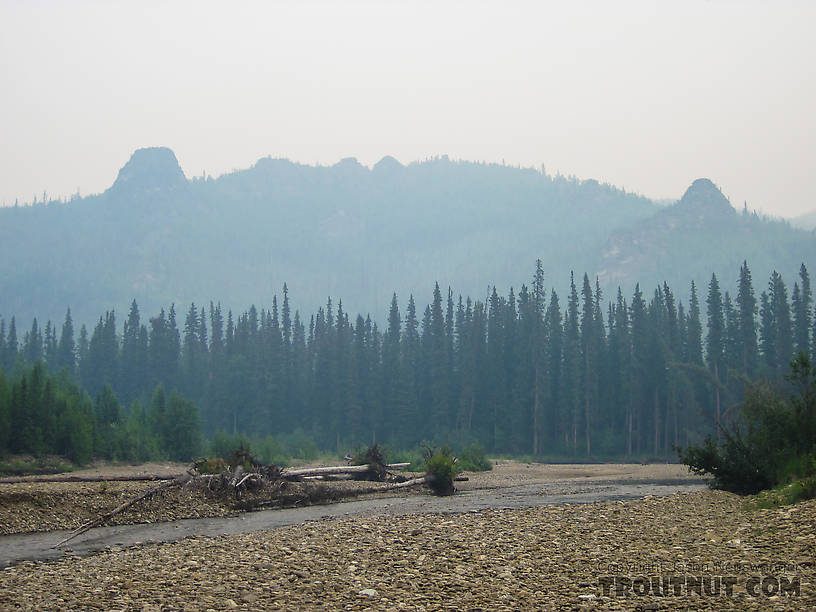
StateAlaska
LocationChena River
Date TakenJul 2, 2013
Date AddedJul 13, 2013
AuthorTroutnut
CameraCanon PowerShot D10
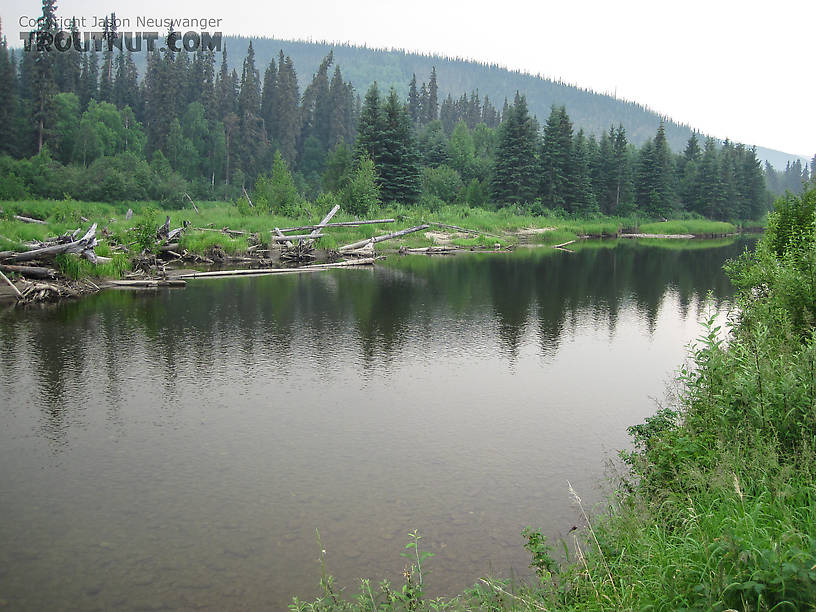
StateAlaska
LocationChena River
Date TakenJul 2, 2013
Date AddedJul 13, 2013
AuthorTroutnut
CameraCanon PowerShot D10
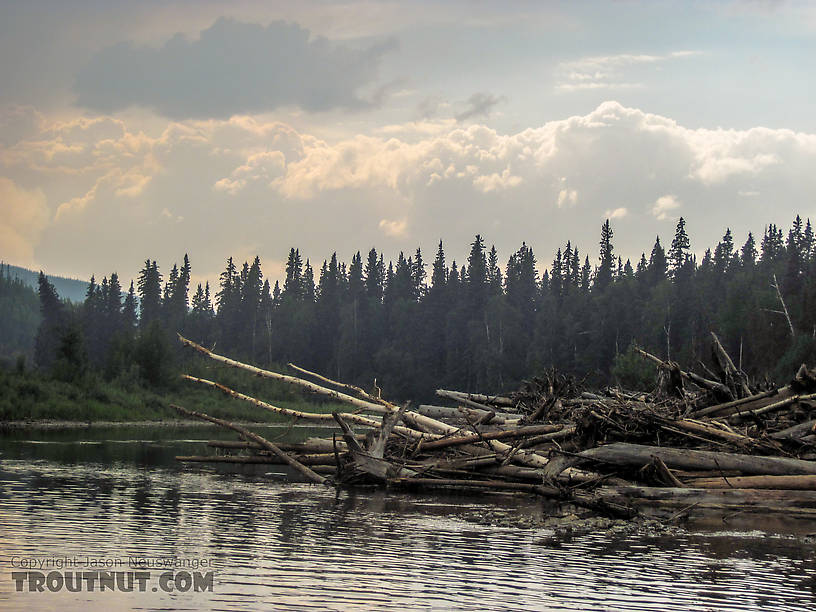
StateAlaska
LocationChena River
Date TakenJul 2, 2013
Date AddedJul 13, 2013
AuthorTroutnut
CameraCanon PowerShot D10
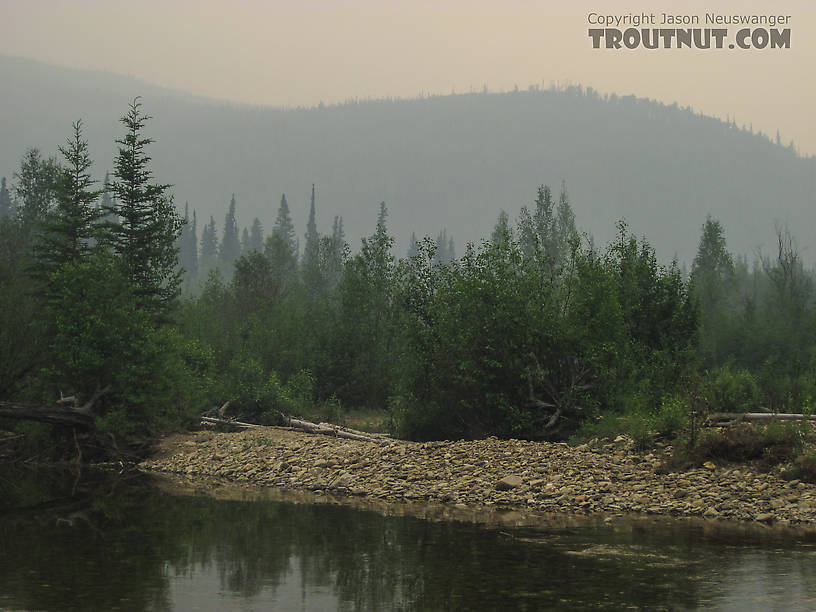
StateAlaska
LocationChena River
Date TakenJul 2, 2013
Date AddedJul 13, 2013
AuthorTroutnut
CameraCanon PowerShot D10
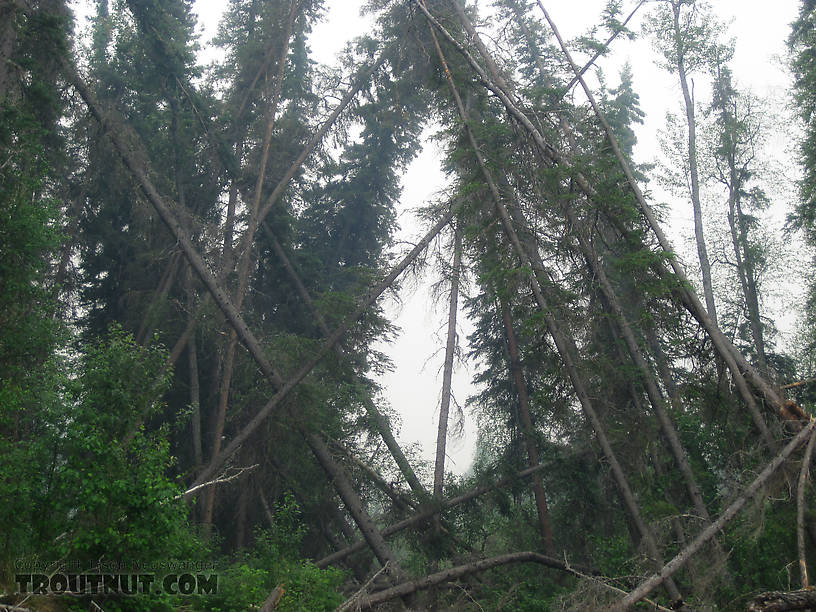
StateAlaska
LocationChena River
Date TakenJul 2, 2013
Date AddedJul 13, 2013
AuthorTroutnut
CameraCanon PowerShot D10
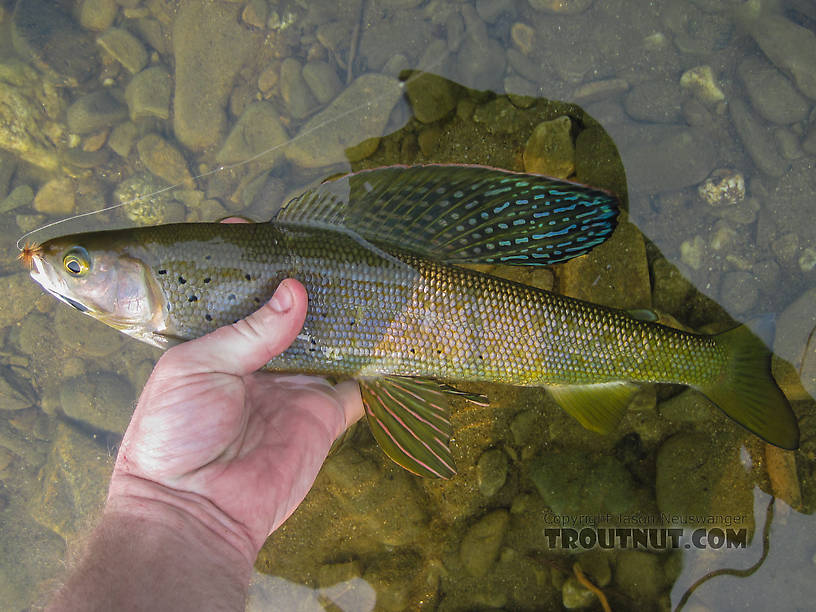
This nice grayling (about 17 inches) was the lone resident of a deep, practically still-water pool in a low-flow side channel of the upper river.
I coaxed it out with a risky sidearm cast into a narrow window under some low-hanging brush, a feat about which I must brag to make myself feel better about my next several attempts at impressive casts, all of which resulted in wading across the river and spoiling the pool to retrieve the fly from a tree.
I coaxed it out with a risky sidearm cast into a narrow window under some low-hanging brush, a feat about which I must brag to make myself feel better about my next several attempts at impressive casts, all of which resulted in wading across the river and spoiling the pool to retrieve the fly from a tree.
StateAlaska
LocationChena River
Date TakenJul 2, 2013
Date AddedJul 13, 2013
AuthorTroutnut
CameraCanon PowerShot D10
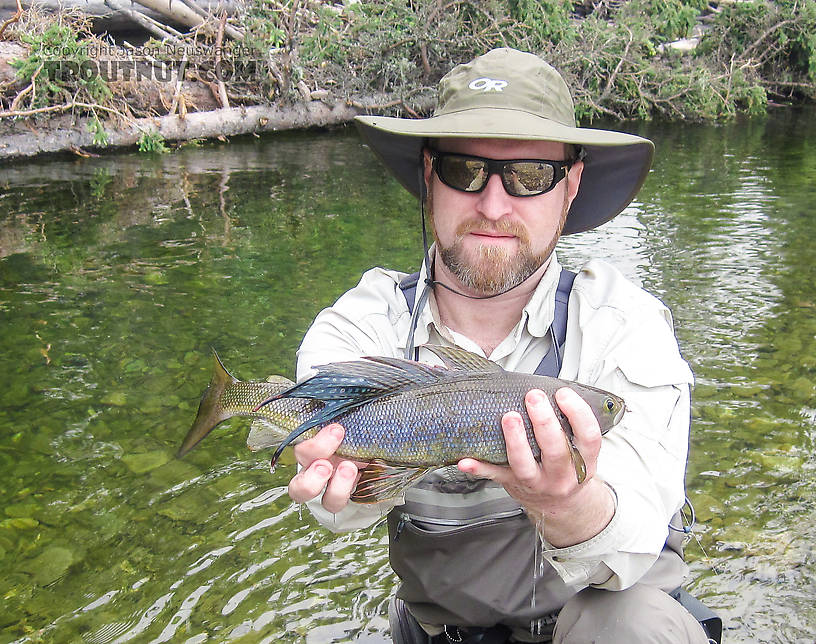
This old grayling had some serious battle scars on its dorsal fin, something I've never seen before catching many hundreds of fish.
StateAlaska
LocationChena River
Date TakenJul 2, 2013
Date AddedJul 13, 2013
AuthorTroutnut
CameraCanon PowerShot D10
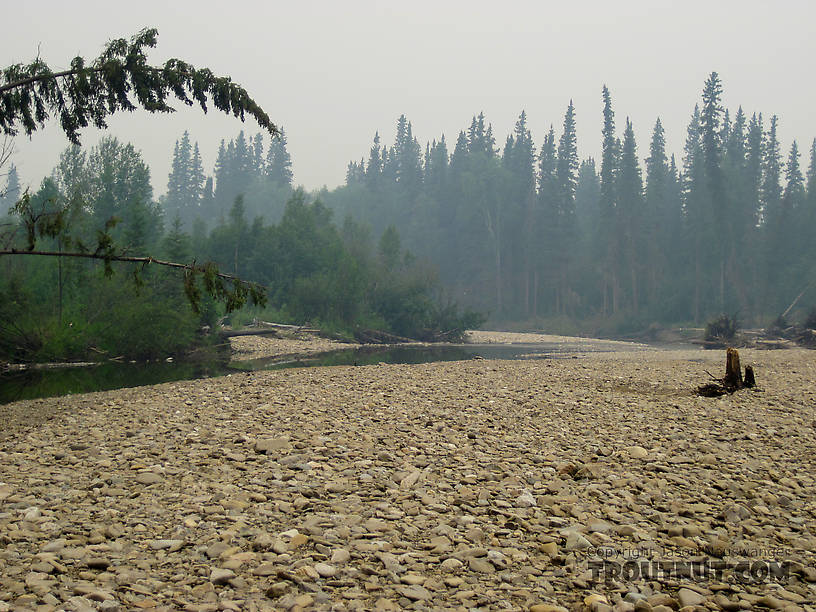
StateAlaska
LocationChena River
Date TakenJul 2, 2013
Date AddedJul 13, 2013
AuthorTroutnut
CameraCanon PowerShot D10
Most recent comments on this post (latest on top)
| Troutnut | July 17th, 2013, 2:55 pm | |
Administrator Bellevue, WAPosts: 2737 | I have no trouble sleeping when it's light at night, and find it no more difficult than taking a nap during the day. Some people have to sleep with masks or block out all the light in their room, though. | |
| Jason Neuswanger, Ph.D. Troutnut and salmonid ecologist | ||
| Adirman | July 17th, 2013, 7:42 am | |
| Monticello, NY Posts: 505 | Must take some getting used to though, with 24/7 light, hard to sleep at "night" is it? | |
| Jmd123 | July 16th, 2013, 11:32 pm | |
| Oscoda, MI Posts: 2611 | Absolutely beautiful Jason, fish and everything else. Is that a lot of Sitka spruce I am seeing? My favorite tree from Oregon... Jonathon | |
| No matter how big the one you just caught is, there's always a bigger one out there somewhere... | ||
| Martinlf | July 13th, 2013, 5:43 pm | |
Moderator Palmyra PAPosts: 3233 | Gorgeous fish, Jason. | |
| "He spread them a yard and a half. 'And every one that got away is this big.'" --Fred Chappell | ||
Comment on this post
Top 10 Fly Hatches
Top Gift Shop Designs
Eat mayflies.
Top Insect Specimens
Miscellaneous Sites
Troutnut.com is copyright © 2004-2024 Jason
Neuswanger (email Jason). See my FAQ for information about use of my images.
 privacy policy
privacy policy
